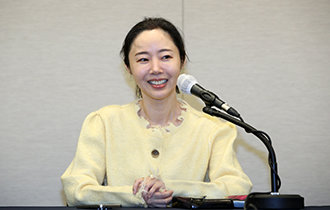The U.S. is in a democracy trap?
This reporter lives in Washington and many U.S. Federal government officials live at apartments in the neighborhood. In the last two weeks, I heard a lot of noises coming from the apartments. The reporter asked about it to the administration center who said the sounds were from people temporarily laid off due to government shutdown repairing their houses.
The reporter went to a shutdown consoling party that was held in the apartment complex. People were making a toast saying they are enjoying the time off work. However, they were also concerned about a possible long shutdown. The wives who had to stay home all day long with their husbands said, "Please take back my husbands."
The words "complaints" and "perplexed" were the most used words at the party. Some were pouring out bitter comments on the country`s uncertain future and endless political strife. One resident said, "Watching what`s going on these days, I want to give the government a "There`s enormous room for improvement" grade, the bottom grade given to students at report cards."
Americans are not complaining at least for now that the shutdown and default risk issue has been settled. However, they are ashamed of the country`s political system that boasts of the world`s best democracy. U.S. democracy failed to reach the very basic agreement on government operation, and worried the world. There is a loud call for self-examination within the country. Experts liken the latest incident to a self-destruct that facilitates a decline in the global status of the U.S.
Indeed, the default risk and shutdown demonstrate a decline in U.S. status and a cause for chaos of world economy. Yet little criticism came from foreign countries. Though the world could be quietly enjoying the U.S. troubles and make complaints after some time later, the official responses of foreign countries and the International Monetary Fund took the form of moderate advices like "We believe the U.S. solves this matter well."
The U.S. had self-described as the solver of global economic crisis. For countries suffering crisis, the U.S. presented extreme measures either directly or through the IMF. Korea was not an exception when suffering from the currency crisis in 1997. However, as the crisis mediator became the crisis sufferer itself, there was no one to initiate leadership. Washington Post said no country told the U.S. hard truths or proposed measures, adding an absence of external forces led the U.S. political sector to prolong strife and shift responsibility.
Government shutdown was triggered by political conflict and not economic problems, making less room for other countries to make advice since it can be considered as interference in domestic affairs. However, the U.S. repeatedly promoted a brinkmanship politics on fiscal issues, raising fears of a global economic crisis. Keeping silent on such act is dereliction of duty. China was the sole country to make harsh criticism on the U.S. However, the U.S. is not likely to accept China`s advice sincerely since the latter lags far behind global standards.
The late former British Prime Minister Winston Churchill said, "The U.S. invariably does the right thing, after having exhausted every other alternative." He meant the U.S. democracy is achieved after a noisy process that accommodates opposition forces` opinions. Yet the chaos that the U.S. political system is into today is not a pathway to democracy but an exhaustion of nation`s energy and power. The U.S. needs a country that makes startling admonition as it does listen carefully to sincere advices.







